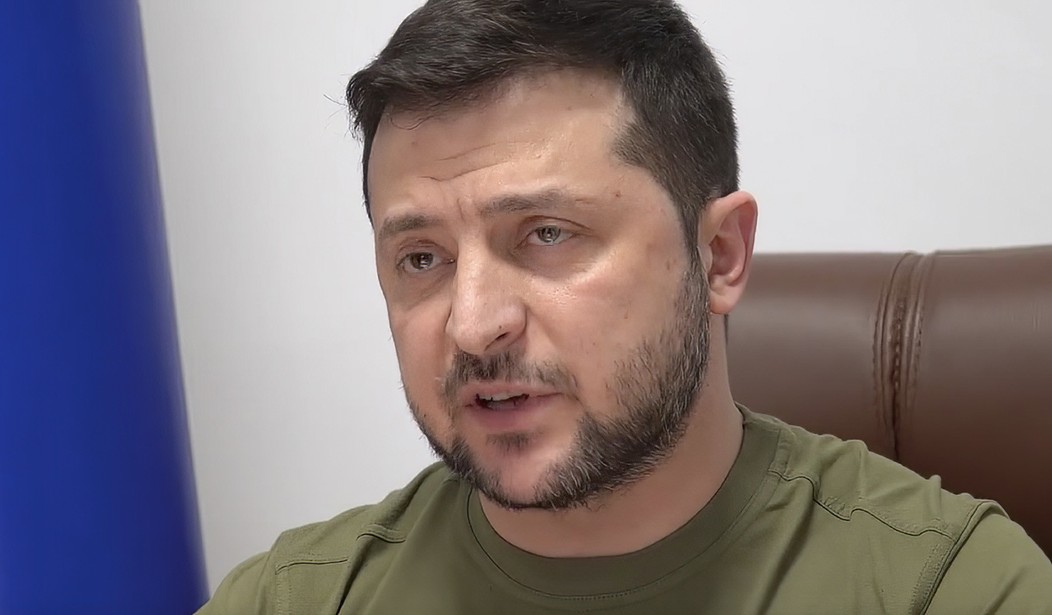President Joe Biden recently signed into law a massive $40 billion "emergency" measure allocating additional U.S. aid to Ukraine. That $40 billion sum, which includes $20 billion in direct military assistance, $8 billion in general economic support, $5 billion directed toward food shortages and $1 billion toward the Ukrainian refugee crisis, comes on top of Congress's earlier $13.6 billion aid appropriation.
On Wednesday, the White House announced that due to this additional funding, the U.S. "will be able to keep providing Ukraine with more of the weapons that they are using so effectively to repel Russian attacks." Specifically, the military portion of the massive $40 billion figure will fund "new capabilities and advanced weaponry," including four advanced guided-rocket systems equipped for a 48-mile range.
Around the same time, Ukrainian President -- and newfound liberal internationalist icon -- Volodymyr Zelensky has dug in his heels. Speaking in Davos, Switzerland, at the World Economic Forum, famed foreign policy realist and former U.S. Secretary of State Henry Kissinger suggested that Zelensky should countenance minor territorial concessions in order to more expeditiously end Russia's war of aggression. Specifically, Kissinger suggested a "return to the status quo ante," translating to de facto Russian control over the Crimean peninsula and Ukraine's two easternmost subregions, Luhansk and Donetsk (which collectively comprise the Donbas).
Zelensky, whose Ukrainian forebears were deeply complicit in the Nazi massacre at Babi Yar, had the temerity to lecture Kissinger, a Jew whose family fled Nazi Germany in the 1930s, about World War II. Zelensky invoked former British Prime Minister Neville Chamberlain's infamous "peace for our time" cession of the Sudetenland in the Munich Agreement of September 1938, scolding Kissinger: "It seems that Mr. Kissinger's calendar is not 2022, but 1938, and he thought he was talking to an audience not in Davos, but in Munich of that time."
Recommended
Zelensky has every right to say, and do, what he feels is in (SET ITAL) his (END ITAL) country's best interests. Indeed, he should be doing exactly that. But the confluence of this massive U.S. aid package -- like so much else in Washington, compiled in rushed fashion and outside the normal appropriation process -- and Zelensky's continued defiance raises an obvious question: Is no-questions-asked, no-strings-attached and possibly indefinite funding for Zelensky's effort to repel Russian forces from Crimea and the Donbas in (SET ITAL) America's (END ITAL) best interest? (There remains scattered fighting outside those areas, but the fighting is now concentrated there.)
The answer is no.
That is not to say anyone should be actively rooting for Russia and its thuggish president, Vladimir Putin. On the contrary, I have maintained since day one of the present contretemps that it would be best for the U.S. national interest if Ukraine remains a truly independent buffer zone and does not suffer the fate of its northerly neighbor Belarus, which is only nominally independent and exists as a Russian satrapy.
At the same time, other hard realities beckon. One of those realities is the obvious truth that the U.S. national interest -- and the world's interest, for that matter -- is best served by the end of any major war, let alone one that includes a nuclear power as a combatant. A second reality is that Russia retreated from Kyiv and its surrounding area last month and, contra Zelensky's table-pounding, it is simply not of tremendous importance to the American national interest whether Crimea and the Donbas fall under Ukrainian or Russian territorial jurisdiction. A third and related reality, which partially explains that relative lack of American concern, is that Putin, as awful as he is, is not Adolf Hitler.
Zelensky is thus offering a facile analogy: The situation in eastern Ukraine in June 2022 is not comparable to the perilous pre-World War II situation in Europe. Russia in the year 2022 is a hostile actor that routinely allies with American geopolitical foes, such as China and Iran, but it is not a Nazi-style imperialist hegemon seeking to subjugate an entire continent under its totalitarian and genocidal rule. Russia has the world's 11th-largest GDP and is largely dependent on exports from its now-heavily sanctioned oil and natural gas industry; indeed, its economy could contract by as much as 10% this year, according to a Bloomberg survey published Tuesday. The fact that Putin largely abandoned his quest to conquer Kyiv last month, instead focusing on coastal enclaves such as Mariupol, is a symptom of the fact Russia is operating with limited economic and political capital.
Given that increasingly limited capital and the fact Kyiv is secure for the time being and Ukraine has thus avoided a Belarusian-style fate, the question is whether the U.S. taxpayer ought to remain on the continual hook for arming Zelensky -- to the extent the American money will even find its way to him, amidst the corrupt cesspool that is Ukraine's bureaucracy. Instead, the U.S. ought to be utilizing its unique geopolitical role to urge Zelensky to be more pliable at the negotiating table -- or at a minimum, conditioning America's future "emergency" aid upon Zelensky doing so. The alternative is to risk the American taxpayer being on the indefinite hook for feeding a war machine against a revanchist and nuclear-armed Russia -- all to contest breakaway regions where there are myriad ethnic Russians with more loyalty to Moscow than to Kyiv.
Westerners typically prefer cleanly drawn maps, but there still remain many geographically contested areas: The West Bank, Jammu and Kashmir, Northern Cyprus and the Western Sahara all come to mind. As long as Ukraine remains independent and evades Belarus' fate, there is no reason to object to the similar contestation of ethnically mixed geographic extremities such as Crimea and the Donbas.
Zelensky, alas, disagrees. As evidenced by his chutzpah in swatting down Kissinger, he has become inebriated with the outpouring of support from liberal internationalists the world over. Accordingly, it would now be prudent to check Zelensky's ego and rein him in a bit.
To find out more about Josh Hammer and read features by other Creators Syndicate writers and cartoonists, visit the Creators Syndicate website at www.creators.com.

























Join the conversation as a VIP Member